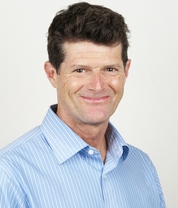
Professor Christopher Goodnow
Professor Chris Goodnow holds The Bill and Patricia Ritchie Foundation Chair as Head of the Immunogenomics Laboratory, a NHMRC Senior Principal Research Fellow, and is Professor and Chair of the Cellular Genomics Futures Institute at UNSW Sydney.
With an American father and Australian mother, Chris grew up in Washington DC before moving to Sydney as a teenager. He trained in veterinary medicine and surgery, immunochemistry and immunology at the University of Sydney and in DNA technology at Stanford University. After doctoral studies begun at the Walter and Eliza Hall Institute in Melbourne and performed at Sydney University, he joined the faculty of Stanford University Medical School and the Howard Hughes Medical Institute in 1990. There he established the concept of multiple immune tolerance checkpoints, a framework now widely used in cancer treatment with “checkpoint inhibitors”, and revealed the function of key genes in these checkpoints including FAS, CD86, PTPN6/SHP1, and later AIRE.
To pioneer genome-wide analysis of the DNA sequences controlling the immune system, he joined the faculty at the Australian National University in 1997 as Professor and founding Director of the Medical Genome Centre, leading its development into a major national research facility, the Australian Phenomics Facility. That effort revealed critical, entirely unknown functions of fourteen essential genes controlling the immune system, including CARD11, ROQUIN1, HNRNPLL, THEMIS, DOCK8, ATP11C, SPPL2A, ZFP318, GSDMD and ETAA1, as well as four previously obscure genes in neurodegeneration and infertility.
Chris joined the Garvan Institute of Medical Research in 2015 as Deputy Director and to translate genomic DNA sequence analysis of the human immune system into understanding the cause of immune disorders and developing more effective, personalised treatments. In his time at Garvan, he has forged a close partnership between Garvan and Israel’s Weizmann Institute of Science, and has overseen the development of the multi-million dollar Garvan-Weizmann Centre for Cellular Genomics, the only multidisciplinary centre of its kind in the southern hemisphere. He was key to the development of CIRCA (Clinical Immunogenomics Research Consortium Australia), a Garvan-led national initiative that seeks to diagnose, understand and treat individuals with rare immune disorders through a combination of genomic DNA sequencing, clinical expertise and biomedical research.
Chris is now leading Hope Research – a transformative research program that is an initiative of the Garvan-Weizmann partnership and is supported by The Bill and Patricia Ritchie Foundation. Hope Research aims to uncover a common cause for all autoimmune disease, which include more than 100 different diseases that collectively affect one in eight people. Using single cell DNA sequencing, Chris and his team are tracking down and identifying the ‘rogue’ immune cells in the blood of adults with 44 autoimmune diseases, which drive the immune system to attack parts of the body.
Chris’ research contributions have been recognised by numerous awards, including the American Association of Immunologists (AAI) Pharmingen Investigator Award, AAI Distinguished Lecturer, Australasian Society for Immunology Burnet Orator, Gottschalk Medal, Health Minister’s Prize, Centenary Medal, Ramaciotti Medal, GSK Award for Research Excellence, William E. Paul Award. He is a Fellow of the Australian Academy of Science, Fellow of the Royal Society (UK), and Member of the US National Academy of Sciences. He was President of the Australasian Society for Immunology in 2015-2016.
Beyond his research endeavours, Chris enjoys spending time with his family and surfing at Sydney’s Manly Beach and on the NSW South Coast. Surfing has been a passion since his school days, and he is well known in surfing circles for leading a 1980 expedition discovering the now-famous breaks in Indonesia’s remote Mentawai Islands.
Awards
- 2018William E Paul Memorial Award - The Foundation for Primary Immune Diseases
- 2013Member of the US National Academy of Science
- 2012Glaxo-Smith-Kline Award for Research Excellence
- 2010NHMRC Australia Fellow
- 2010The Ramaciotti Medal
- 2009Fellow of the Royal Society
- 2007Ramaciotti Major Research Award
- 2006ARC Federation Fellow
- 2006Centenary Medal
- 2005Health Minister’s Prize for Excellence in Medical Research
- 2005ISI Highly Cited Researcher
- 2002Fellow of the Australian Academy of Science
- 2001Gottschalk Medal - Australian Academy of Science
- 1998American Association of Immunologists Pharmingen Investigator Award
- 1992Searle Scholar
- 1990Investigator of the Howard Hughes Medical Institute
- 1989Medical Foundation Postdoctoral Fellowship
- 1986NH & MRC Biomedical Research Scholarship
- 1984Honours Class I with B.V.Sc. degree; Honours Class I and University Medal with B.Sc.(Vet) degree
- 1979John Gurner and Frederick Ebsworth Prize for Biology - University of Sydney
Selected publications
See all publications- 2023Leukemia10.1038/s41375-023-01918-9
Network analysis reveals a major role for 14q32 cluster miRNAs in determining transcriptional differences between IGHV-mutated and unmutated CLL.
- 2017Acta Crystallographica. Section D, Structural Biology10.1107/S2059798317013730
Structural basis of antigen recognition: crystal structure of duck egg lysozyme.
